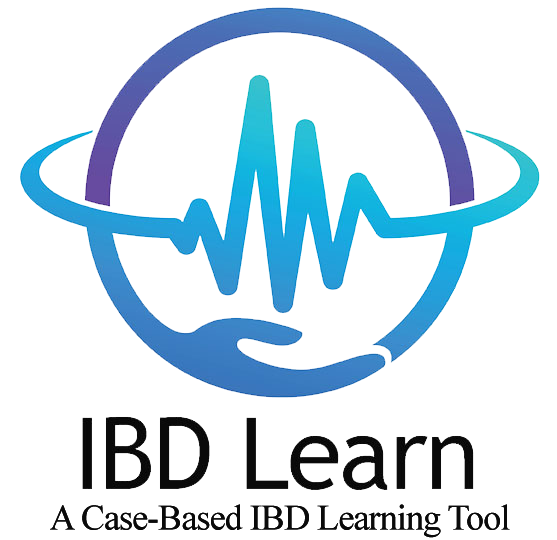Case 12 Discussion
Learning Objectives
- Classify IBD phenotype using validated classification system
- Recognize patients requiring surgery for IBD
- Classify IBD based on risk of postoperative recurrence and summary IBD therapy accordingly
- Manage IBD in special populations
IBD EPAs
EPA 1: Classify IBD phenotype, disease activity, and extraintestinal manifestations
EPA 4: Manage adverse events and complications of IBD and IBD therapies
EPA 6: Manage preoperative and postoperative care for patients with IBD
Discussion
This case highlights the value of a longitudinal therapeutic relationship with IBD patients. While his clinical history was certainly suggestive of Crohn’s disease, the fact that it had always been limited to the small bowel as in the case of 5-10% of Crohn’s patients did make the diagnosis a clinical and radiographic one, instead of traditionally being supported by histology and endoscopic findings. His comorbid HIV status also raised the question of more rare enteric infections such as tuberculosis or malignancies such as lymphoma. Isolated small bowel Crohn’s disease can be difficult to diagnose as patients typically do not present with the common symptoms of IBD such as hematochezia, abdominal pain, tenesmus, weight loss, or diarrhea. Symptoms can be insidious over many years and a longitudinal history is vital. Minimal symptoms may also cause patients to be hesitant to start therapy, though we know that stricturing disease is typically progressive, often in a step-wise fashion with prolonged symptom-free periods over many decades.
Additionally, this patient’s HIV status did draw appropriate questions about the safety of long-term immunosuppressive therapy. One review shows a correlation between IBD relapse and lower CD4 counts (Adiga et al). Given that his CD4 count was high and HIV viral load was undetectable, it was felt to be safe to use whatever therapy was necessary to control his potentially life-threatening IBD. In patients with more severe immunosuppression, consultation with an infectious disease specialist can be useful to guide therapy and optimize HIV care. There is limited but expanding data on the association with patients with HIV and IBD. Some data shows slightly fewer flares in HIV infected patients compared to uninfected patients (0.016/year of follow-up compared to 0.053/year of follow-up). The GETAID study showed no significant difference in survival for HIV infected compared to uninfected patients with either Crohn’s Disease or Ulcerative Colitis. HIV infected patients were exposed to slightly fewer biologics and had similar rates of adverse effects related to biologics compared to HIV uninfected patients.
While great efforts were made to start the patient on therapy to help negate the need for emergent surgery, ultimately it took a complication for the patient to realize the importance of medical therapy. Since you had a good therapeutic relationship with the patient over many years, he was able to quickly establish care post-operatively and start biologic therapy.
Citations
- Bernardes C et al. Primary HIV infection in a Crohn’s disease patient receiving infliximab maintenance therapy. AIDS. 2018: 32(1)130-131. doi: 10.1097/QAD.0000000000001670
- Adiga A, Panikkath D, Nugent K. A Review of Inflammatory Bowel Disease in Patients with Human Immunodeficiency Virus Infection. J AIDS Clin Res 2016. 7: 575. doi:10.4172/2155-6113.1000575
- Yamada A et al. The Use of Vedolizumab in Preventing Postoperative Recurrence of Crohn’s Disease. Inflamm Bowel Dis. 2018;24(3)502-509
- Nguyen GC, Loftus EV Jr, Hirano I, Falck-Ytter Y, Singh S, Sultan S; AGA Institute Clinical Guidelines Committee. American Gastroenterological Association Institute Guideline on the Management of Crohn’s Disease After Surgical Resection. Gastroenterology. 2017 Jan;152(1):271-275. doi: 10.1053/j.gastro.2016.10.038. Epub 2016 Nov 10. PMID: 27840074.
- Cepeda EJ, et al. The use of anti-tumour necrosis factor therapy in HIV-positive individuals with rheumatic disease. Ann Rheum Dis. 2008 May;67(5):710-2. doi: 10.1136/ard.2007.081513. Epub 2007 Dec 13. PMID: 18079191.
- Viazis N, et al. Course of inflammatory bowel disease in patients infected with human immunodeficiency virus. Inflamm Bowel Dis. 2010 Mar;16(3):507-11. doi: 10.1002/ibd.21077. PMID: 19714759.
- Guillo L et al. Impact of HIV Infection on the Course of Inflammatory Bowel Disease and Drug Safety Profile: A Multicenter GETAID Study. Clin Gastroenterol Hepatol. 2020 Dec 24:S1542-3565(20)31719-5. doi: 10.1016/j.cgh.2020.12.023. Epub ahead of print. PMID: 33359726.
